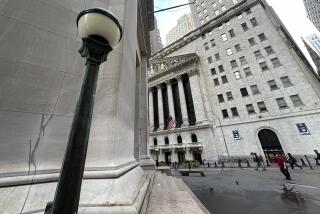Stocks Advance on Broad Front; Dow Gains 24.33 : Hopes for Continued Drop in Interest Rates Keep Market Rally Rolling
NEW YORK — Stock prices rose broadly Tuesday, aided by continued optimism that interest rates will keep falling and that the stock market has more room to recover from its steep selloff last month.
The Dow Jones average of 30 industrials, aided by a late blue-chip buying surge, rose 24.33 to 1,835.49. The gain followed a 28.54-point rise Monday and mirrored the advance of the broader market,
Two issues rose in price for every one that declined on the New York Stock Exchange.
Stocks staged a widespread but moderate advance for much of the day, picking up steam late in the session as buyers became more confident in market resistance to attempts at a selloff, analysts said.
“That suggests the recovery phase has a way to go,” said Newton Zinder, senior vice president of E. F. Hutton in New York. “But there’s still very little evidence it will blossom into a full-scale, long-lasting advance.”
Also aiding stock prices were expectations that interest rates will keep falling if retail sales figures to be released today and industrial production figures due out Friday show continuing economic sluggishness, as expected. Many economists believe that would give the Federal Reserve Board more incentive to push interest rates lower for economic stimulation.
Big Three Industries Most Active
Some analysts noted, however, that the Fed already had made major rate cuts twice this year with little apparent effect. As such, a full-bore stock market rally was unlikely in the near future without indications of an economic upturn, they said.
Big Three Industries rose 4 1/2 to 28 5/8 to lead the list of most active NYSE issues with 5.1 million shares changing hands. The company said it has agreed to be acquired by a subsidiary of L’Air Liquide S.A. for $29 a share.
Owens-Corning Fiberglas rose 1/8 to 78 in heavy trading. Wickes Cos. on Tuesday began a $74-a-share tender offer for all of the company’s outstanding common shares. Wickes was down 1/8 at 5 to lead the American Stock Exchange active list.
J. C. Penney rose to 77 1/2, Wal-Mart 3/4 to 45 1/2 and Woolworth 5/8 to 41 3/8. The three retailers posted strong second-quarter profit gains Tuesday.
The shares of major auto makers rose. Ford was up 2 1/8 to 58 3/4 in heavy trading, Chrysler 1 to 39 3/4 and GM 1 3/4 to 73 1/2.
Financial institutions, which benefit from the decline in interest rates, were mixed. Chase Manhattan was up 3/8 to 41, Citicorp fell to 54 1/8, First Boston rose 2 to 52 1/2 and J. P. Morgan rose 1 3/8 to 91 3/4.
Actively traded blue chips included IBM, up 1 1/2 to 132 1/2; Goodyear, up 7/8 to 32; United Technologies, up 1 3/4 to 44 3/8; Sears, Roebuck, up 1 to 44 1/2, and AT&T;, unchanged at 24.
Precious metals mining issues dipped as gold and platinum prices pulled back after soaring Monday. ASA was down 3/4 to 34 3/4, Hecla 3/8 to 11 1/2 and Homestake 3/4 to 24 1/2.
Big Board volume totaled 131.71 million shares, against 125.6 million on Monday.
Nationwide turnover in NYSE-listed issues, including trades in those stocks on regional exchanges and in the over-the-counter market, totaled 158.64 million shares.
There were 2,601 blocks of 10,000 or more shares traded on the NYSE, compared to 2,273 on Monday.
Standard & Poor’s index of 400 industrials rose 2.95 to 269.05, and S&P;’s 500-stock composite index was up 2.66 to 243.34.
Cautious Trading
Bond prices were little changed as dealers also awaited the latest government reports on the economy.
Jay Goldinger of the Beverly Hills investment banking firm Cantor, Fitzgerald & Co. said dealers were cautious about buying pending the outcome of the reports.
Sluggish economic growth increases the likelihood that interest rates will descend further, analysts say. Falling rates are good news for the credit markets because bond prices gain when yields drop.
Bond dealers said the credit markets had been buoyed in early trading by speculation that the United States and other major industrialized countries might undertake a coordinated round of interest rate cuts next month.
Optimism about the chances that the Fed and its counterparts in West Germany, Japan and possibly Britain and France might trim their principal loan rates helped to drive down short-term interest rates in the credit markets.
Treasury Bill Yields Fall
Yields on three-month Treasury bills were down 2 basis points to 5.64%. Six-month bills dropped 7 basis points to 5.62%. One-year bills fell a basis point at 5.71%. A basis point equals a hundredth of a percentage point.
In the secondary market for government securities, prices of short-term governments rose by 3/16 point and intermediate maturities rose by 1/16 point, according to the investment firm of Salomon Bros.
The closely watched 30-year Treasury bond fell 1/8 point from the late Monday level, which left its yield unchanged at 7.35%. The 20-year bond fell 1/16 point. The movement of a point is equivalent to a change of $10 in the price of a bond with a $1,000 face value.
In corporate trading, industrials fell point and utilities fell 3/8 point in light trading.
Among tax-exempt municipal bonds, general obligations rose 1/2 point in light trading and revenue bonds were up 1 point in heavy trading.
The federal funds rate traded at 6.1875%, down from 6.25% late Monday.
More to Read
Inside the business of entertainment
The Wide Shot brings you news, analysis and insights on everything from streaming wars to production — and what it all means for the future.
You may occasionally receive promotional content from the Los Angeles Times.










